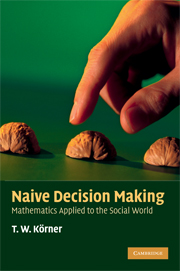Book contents
- Frontmatter
- Contents
- Introduction
- 1 A day at the races
- 2 The long run
- 3 The vice of gambling and the virtue of insurance
- 4 Passing the time
- 5 A pack of cards
- 6 Other people
- 7 Simple games
- 8 Points of agreement
- 9 Long duels
- 10 A night at the casino
- 11 Prophecy
- 12 Final reflections
- Appendix A The logarithm
- Appendix B Cardano
- Appendix C Huygens's problems
- Appendix D Hints on pronunciation
- Bibliography
- Index
3 - The vice of gambling and the virtue of insurance
Published online by Cambridge University Press: 06 July 2010
- Frontmatter
- Contents
- Introduction
- 1 A day at the races
- 2 The long run
- 3 The vice of gambling and the virtue of insurance
- 4 Passing the time
- 5 A pack of cards
- 6 Other people
- 7 Simple games
- 8 Points of agreement
- 9 Long duels
- 10 A night at the casino
- 11 Prophecy
- 12 Final reflections
- Appendix A The logarithm
- Appendix B Cardano
- Appendix C Huygens's problems
- Appendix D Hints on pronunciation
- Bibliography
- Index
Summary
Bernard Shaw
The title for this chapter is taken from an essay in which Shaw explains the principle of insurance and its relation to the welfare state. Shaw begins, as we have done, on the race-track and continues as follows.
[A] bookmaker must never gamble though he lives by gambling. There are practically always enough variable factors in the game to tax the bookmaker's financial ability to the utmost. He must budget to come out at worst still solvent. A bookmaker who gambles will ruin himself as certainly as a … publican who drinks, or a picture dealer who cannot bear to part with a good picture.
The question at once arises, how is it possible to budget for solvency when dealing with matters of chance? The answer is that when dealt with in sufficient numbers matters of chance become matters of certainty, which is one of the reasons why a million people organised as a State can do things that cannot be dared by private individuals. The discovery of this fact nevertheless was made in the course of private business.
In ancient days, when travelling was dangerous, and people before starting a journey overseas solemnly made their wills and said their prayers as if they were going to die, trade with foreign countries was a risky business, especially when the merchant, instead of staying at home and consigning his goods to a foreign firm, had to accompany them to their destination and sell them there. […]
- Type
- Chapter
- Information
- Naive Decision MakingMathematics Applied to the Social World, pp. 83 - 110Publisher: Cambridge University PressPrint publication year: 2008



